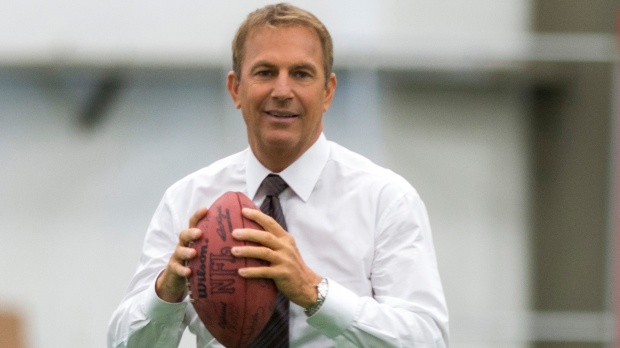Kevin Costner is currently experiencing something of a career resurgence (dubbed the “Costnergence” by some, playing on the “McConaissance” of Matthew McConaughey), having appeared in the Superman reboot Man of Steel, the Tom Clancy reset Jack Ryan: Shadow Recruit, and the McG/Luc Besson actioner 3 Days to Kill over the last year. This weekend he returns to the genre of some of his greatest successes – sports drama – with the Ivan Reitman-directed, NFL-sponsored Draft Day, playing the general manager of the Cleveland Browns attempting to acquire the number one pick in the eponymous player selection meeting. Though this certainly doesn’t sound like the stuff of compelling drama, the genre has shown that it can turn even the most mundane material thrilling through the magic and power of cinema. With that in mind, and for this week’s Top Ten Tuesday, I present my favourite sports dramas:
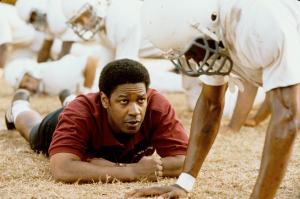 10. Remember the Titans (Boaz Yakin, 2000)
10. Remember the Titans (Boaz Yakin, 2000)
A Disneyized telling of real-life African-American high school football coach Herman Boone (played by everyone’s favourite black man Denzel Washington), who took over head-coaching duties at a segregated Virginia school in 1971 and improbably led the racially volatile team to the championship. The narrative is standard underdog story fare, but the calibre of its cast (also including Will Patton, Wood Harris, and Ryan Gosling in an early role) and its unabashedly optimistic tone just makes it eminently rewatchable – the kind of movie that you always stop to watch while flipping channels, no matter how many times you’ve seen it. Denzel’s had better performances, but this is the kind of role perfectly in his wheelhouse, and he nails it.
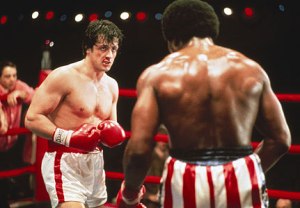 09. Rocky (John G. Avildsen, 1976)
09. Rocky (John G. Avildsen, 1976)
Before it spawned an ungodly number of increasingly jingoistic sequels, the original underdog tale was actually a pretty good flick. In many ways mirroring the rough early life of writer/star Sylvester Stallone, it’s the ultimate rags-to-riches American Dream, following the trials and tribulations of a young Philadelphia boxer as he gets a shot at the world heavyweight championship, and eventually goes the distance with the champ (Apollo Creed, played by Carl Weathers). Looking back now, it’s rather stunning that the film has the balls to have its hero lose (even if by a split decision), something that the innumerable sequels would quickly rectify. It’s also quite something to see Stallone so authentic and natural, as the past few decades have turned him into a plastic superhero; this, of course, remains his crowning achievement.
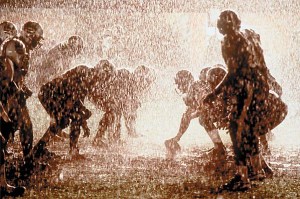 08. Any Given Sunday (Oliver Stone, 1999)
08. Any Given Sunday (Oliver Stone, 1999)
Oliver Stone is nothing if not a versatile filmmaker, as his works have run the gamut from Vietnam War drama (his trilogy of Platoon, Born on the Fourth of July, and Heaven & Earth) to political conspiracy thriller (JFK) to bizarro biopic (The Doors and W.); no matter the genre, though, his films all generally possess the same flashy style, melodramatic tone, and overlong runtime. His lone sports drama falls into this pattern as well, depicting the behind-the-scenes management of a fictional professional sports team in a completely ostentatious and exaggerated manner. Even so, the film largely manages to avoid overblown sports clichés (at least until the end), cutting right to the heart of the matter and depicting the shady backroom dealings of professional sports without much, if any, sugarcoating. It’s not a great work, but it is pretty fascinating.
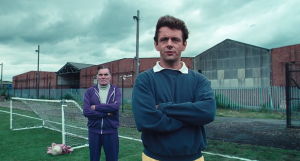 07. The Damned United (Tom Hooper, 2009)
07. The Damned United (Tom Hooper, 2009)
Before he won an Oscar for The King’s Speech, director Hooper helmed this dramatized account of Brian Clough’s ill-fated tenure as manager of professional soccer club Leeds United in 1974, scripted by ubiquitous British screenwriter Peter Morgan and starring ubiquitous British actor Michael Sheen as Clough. It’s not a underdog story at all, in that it’s nasty, sarcastic, mean-spirited, and very funny – not usually the stuff of sports drama – but in its telling of an obnoxious, arrogant, and totally brilliant sports mind whose disagreeable personality partially ruined his career, it’s quite innovative and authentic. Sheen has always been terrific at playing real people (see also: Tony Blair, David Frost) and he’s excellent here, simultaneously charming and unlikeable. There’s not a lot of actual soccer played here, but the behind-the-scenes drama more than makes up for it.
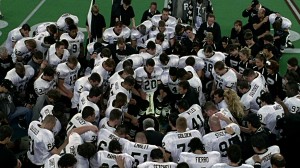 06. Friday Night Lights (Peter Berg, 2004)
06. Friday Night Lights (Peter Berg, 2004)
Later inspiring a TV series that would run for five seasons, this real-life tale of a high-school football team’s run to the championship in the late ’80s runs far deeper than your typical underdog story, delving into racism, socioeconomic disparity, and football obsession in one small Texas town. Billy Bob Thornton is atypically low-key and reserved as the inspirational coach, and a collection of future stars (including Derek Luke, Garrett Hedlund, and Lucas Black) impress as student-players dealing with fame and pressure. Scored by post-rock band Explosions in the Sky and filmed in a hyperreal, vérité-esque fashion, it’s a clichéd sports drama without the cliché, proving that artistry in possible within the genre.
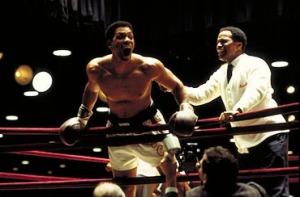 05. Ali (Michael Mann, 2001)
05. Ali (Michael Mann, 2001)
A comprehensive biopic of iconic boxer Muhammad Ali, starring Will Smith as the champ, it was widely received as one of acclaimed director Michael Mann’s lesser works, but this only reveals the sheer brilliance of his oeuvre. While perhaps overlong and melodramatic, it’s also stunningly directed, with Mann utilizing the full arsenal of his filmmaking tricks to capture and represent Ali’s dynamic personality. For his part, Smith is compelling and charismatic, almost making one forget that he’s the Fresh Prince and not the Greatest, and the ensemble cast (also including Jamie Foxx, Jon Voight, Mario Van Peebles [as Malcolm X!], and Jeffrey Wright) is stellar, as in all Mann films. It’s not his best, but it’s still great.
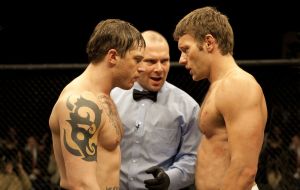 04. Warrior (Gavin O’Connor, 2011)
04. Warrior (Gavin O’Connor, 2011)
On the surface, this tale of two estranged brothers who meet in the final of a MMA (mixed martial arts) championship feels quite clichéd and contrived, and yet the execution is so top-notch that the film pulls it off. By embracing its histrionic family dynamics and not overdoing and exploiting them (à la The Fighter), the film achieves a level of genuine emotion that is all-too-rare in this day and age. Of course it helps to have Tom Hardy, one of the best actors of his generation, indulge his inner Brando and deliver a beastly performance, nearly matched by Joel Edgerton as his slightly more compassionate brother; even Nick Nolte impresses as their alcoholic father, earning an Oscar nomination. Don’t believe the façade – this one’s legitimate.
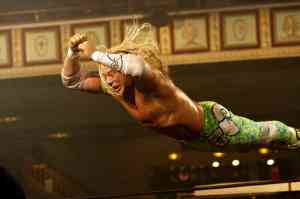 03. The Wrestler (Darren Aronofsky, 2008)
03. The Wrestler (Darren Aronofsky, 2008)
Following the immense critical and commercial disappointment of his grandiose sci-fi work The Fountain, Darren Aronofsky scaled things way back for his next feature, a neo-realist story of a professional wrestler at the end of his career. Adopting cinéma vérité techniques – handheld camerawork, long takes, real-world settings – and casting comeback king Mickey Rourke as the titular figure, Aronofsky crafts a raw, gritty atmosphere that perfectly suits the grim characters and their grim lives. With Marisa Tomei co-starring as a similarly aged stripper, this is a tale of broken individuals attempting to keep on making a living long after their bodies have forsaken them.
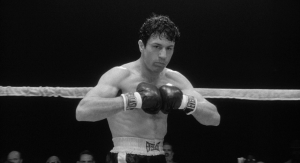 02. Raging Bull (Martin Scorsese, 1980)
02. Raging Bull (Martin Scorsese, 1980)
Scorsese’s near-masterpiece is as much a family drama as a sports one, but it’s the scenes inside the boxing ring that pack the most wallop. Taking an almost minimalist approach to the sport, Scorsese cuts out nearly all background image and sound, strictly focusing on Jake LaMotta’s inner rage and personal demons. The result is a stark, austere portrayal of one man’s self-destructive fury, as he demolishes everything and everyone around him. Though the seemingly endless scenes of domestic abuse feel rather blunt and flat (especially compared to the fighting sequences), De Niro’s impossibly savage performance as the tortured boxer make it worthwhile. In the pantheon of great pugilist pictures, this is the best.
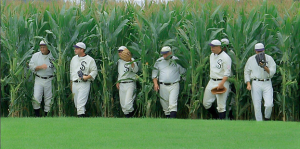 01. Field of Dreams (Phil Alden Robinson, 1989)
01. Field of Dreams (Phil Alden Robinson, 1989)
And so we return to Kevin Costner, in still one of his greatest roles to date. As a good-hearted Iowa farmer who hears voices urging him to build a baseball diamond in his cornfield, Costner has never been more authentic or moralistic; although the film’s fantasy-tinged storyline finds him time traveling and interacting with phantoms, his performance grounds the film in a kind of magical realism. And through the narrative’s great love and nostalgia for the timeless game of baseball, even the non-fans of the sport among us (yours truly included) find something to admire about America’s pastime. It’s an overwhelmingly wholesome movie, and yet it never seems to get old.
